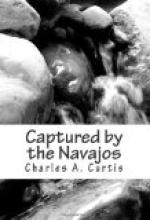Each wall contained a small window, except the one which rested against the butte, and there a wide, stone fireplace had been built. Three men with plenty of rations and ammunition could make a good defence. Water could be had by lowering a bucket or canteen from the southern window to the spring, twenty-four feet below its sill.
The Indians had discovered that we had found shelter from their pursuit and for the present were safe, and all but five, who soon afterwards appeared in the edge of the forest to the east, had joined the main party to the west of us. They showed great respect for our place of refuge and rifles, and kept well out of range. The sergeant’s and my Springfield rifle could throw a bullet farther and could be loaded more rapidly than any rifles in their possession, and Frank with his Spencer could fire about twenty balls to our one.
We removed the saddles and bridles from our animals, and, hitching them in the corners each side of the fireplace, began a discussion of our prospects.
“If we could keep a couple of fires going before the doors during the night, sir,” said the sergeant, “we might keep them away.”
“I am afraid a fire would be of greater advantage to them than to us,” I replied; “we should have to expose ourselves every time we replenished it. I wonder if the roof is covered with earth? It is flat.”
“I’ll tell you in half a minute, sir,” said Frank, and entering the fireplace he proceeded to ascend the wide-mouthed chimney by stepping on projecting stones of which it was built. In a moment he called down to me, “Yes, sir; it is covered with about two feet of earth.”
“All right then. If we can get pine enough to keep a blaze going then we will have one. A fire on the roof will illuminate everything about us and leave our windows and doorways in darkness. It will aid our aim and confuse the Indians.”
We set to work at once and pulled down all the bunks, and with large stones from the fireplace succeeded in breaking into fragments the pine puncheons and posts of which they were made. Then Sergeant Cunningham ascended the chimney and tore away one side of the part which projected above the roof—the side looking in the direction opposite the precipice. This would enable one of us to stand in the top and replenish the fire, and at the same time remain concealed from the enemy. As we could be fired upon from only two directions, the fire tender would be safe.
Fortunately, Padre Gutierrez’s housekeeper had put up a lunch sufficient to last us, including Vic, for three days, and water could be drawn easily through the southern window with a canteen and lariat.
“I’m afraid those chaps ’ll get us in the end, sir,” observed the sergeant. “Of course we can eat horse-meat for a while after our victuals are gone, but we are three and they are twenty-seven—we are prisoners and they are free.”
“Very true, sergeant,” I replied, “but something may turn up in our favor. The Jemez party will reach camp day after to-morrow, and when it learns we are not there we shall be looked up.”




